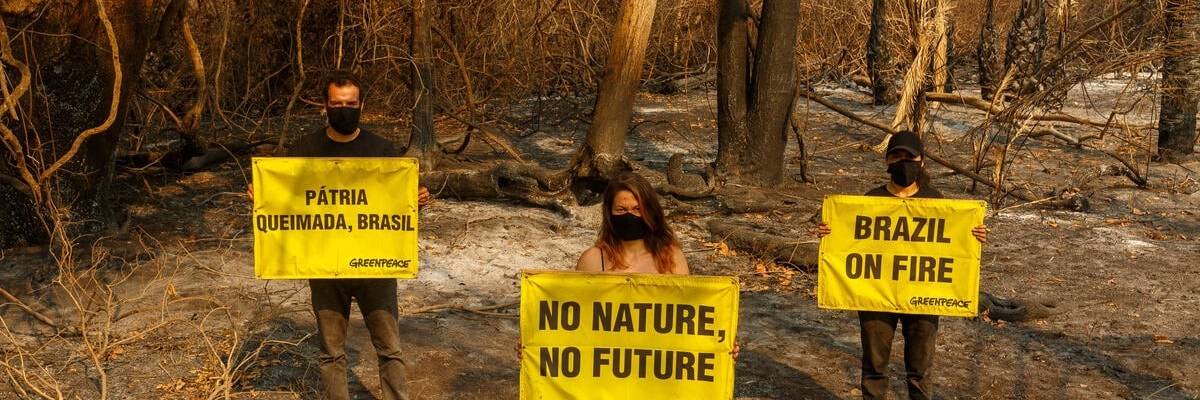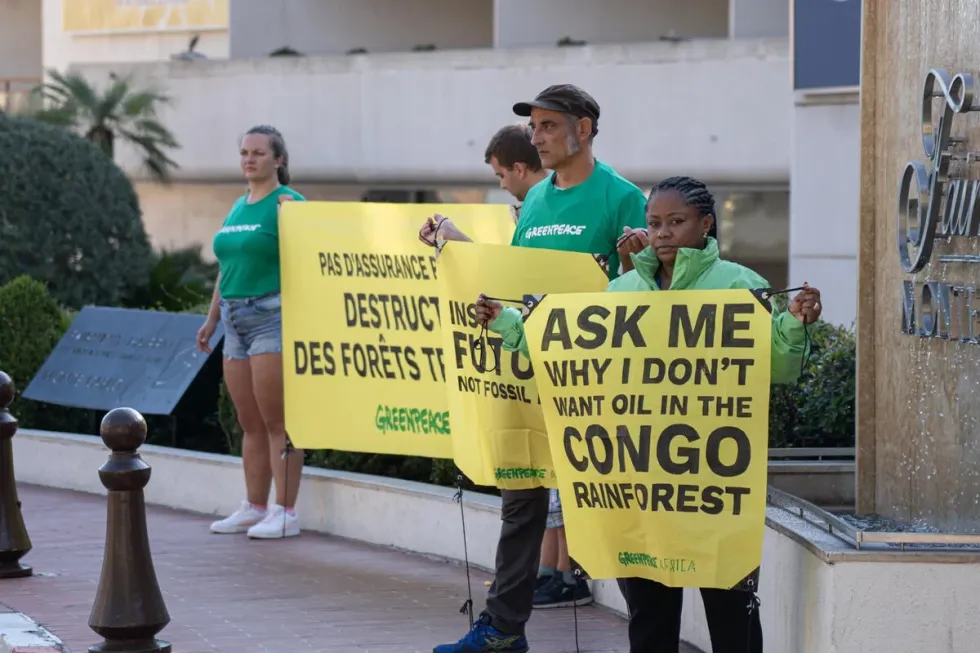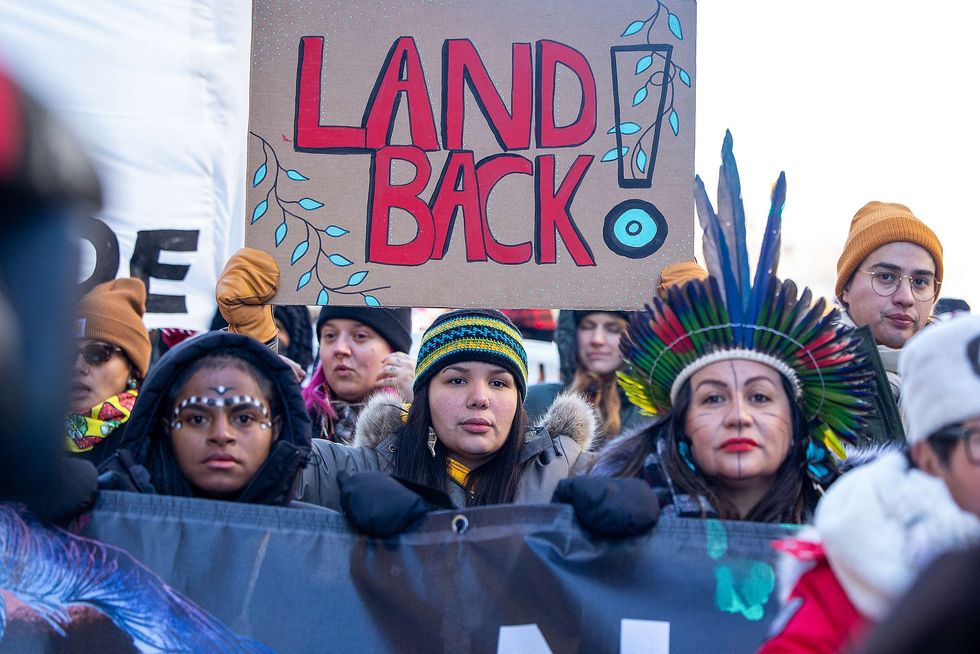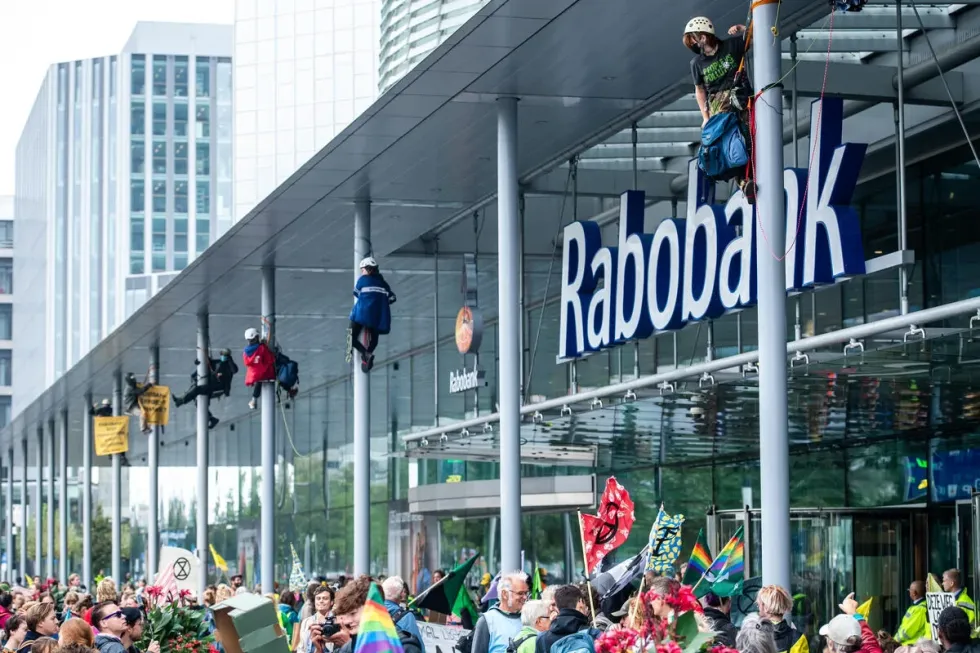

SUBSCRIBE TO OUR FREE NEWSLETTER
Daily news & progressive opinion—funded by the people, not the corporations—delivered straight to your inbox.
5
#000000
#FFFFFF
To donate by check, phone, or other method, see our More Ways to Give page.


Daily news & progressive opinion—funded by the people, not the corporations—delivered straight to your inbox.

Greenpeace Brazil activists mobilized to tie the Bolsonaro government's anti-environmental agenda to wildfires.
As long as money continues to flow towards expansion of economic activities that lead to nature destruction, there is no way we will be able to meet global commitments.
The world is facing multiple crises when it comes to our climate and environment—we know this too well. We are direct witnesses of this destruction and the suffering it causes in our respective countries, Brazil and Indonesia, two countries that are home to ecosystems vital to the ecological balance of our planet.
We follow international efforts to protect and restore nature with concern, determination and hope. As part of efforts to tackle the biodiversity crisis, nearly 200 governments signed the Global Biodiversity Framework (GBF) in December 2022. One of the goals of this agreement is to maintain, enhance and restore the integrity and resilience of ecosystems.
This means we need to stop the destruction of nature right now and allow the recovery of these ecosystems. This should apply not only to forests like the Amazon, Congo Basin, or Carpathian forests, but also to other essential ecosystems such as savannahs (like the Cerrado) and wetlands (like the Pantanal, South America’s largest wetland extending across Bolivia, Brazil, and Paraguay). This action would produce the highest impact in the shortest time. But how do we get there?
A drastic reform of the financial system is urgently needed to address the ongoing loss of species and natural areas
Commitments to tackle the climate and biodiversity crises are being undermined on a daily basis by a finance system that serves polluters and the funding of industries and projects that accelerate environmental degradation and species extinction. Billions continue to flow unabated into destructive activities.
Therefore, a drastic reform of the financial system is key to address the ongoing loss of species and natural areas, and emissions. As long as money continues to flow towards expansion of economic activities that lead to nature destruction, there is no way we will be able to meet these commitments.

In the Global Biodiversity Framework, governments committed (target 14) to ensure that all financial flows would be aligned with the biodiversity conservation goals and targets before 2030. This means governments need to better control public and private money flows.
Governments need to improve existing regulations and develop new regulations that prohibit large banks and other finance institutions from investing in activities that harm the world’s remaining biodiversity—all coupled with rigorous enforcement and transparency, to stop nature destruction and hold wrongdoing to account.
Trillions of dollars in subsidies and investments continue to finance the destruction of natural ecosystems
We are living through a climate and biodiversity crisis, but governments and the private sector are spending around 3.1 trillion dollars a year on harmful subsidies and investments in problematic sectors such as livestock, timber, and palm oil production, leading to the destruction of nature and violations of human rights.
We need legally binding regulations that prohibit banks, asset managers, pension funds, and other financial institutions or investors from financing farms, projects, and companies that harm ecosystems and local communities depending on them. This is especially true for Indigenous peoples, and land and environmental defenders who continue to be attacked despite their vital work for protecting the environment and fighting climate change.

Global government spending on activities leading to biodiversity conservation is estimated at $154 billion per year only, while estimates of the total amount of subsidies and other perverse incentives are much higher as mentioned above. The redirection of these financial flows could generate major funding for the very actions the GBF recognises are at the heart of biodiversity conservation. It could also ensure a just transition in sectors like industrial agriculture and forestry that continue to harm not just biodiversity, but also the communities that depend on these sectors for their livelihoods.
As governments are preparing their plans on how to implement the commitments they have made in the historic Kunming-Montreal Global Biodiversity Framework, we urge them to adopt regulations of the finance sector, control financial flows, and stop and reverse the destruction of natural ecosystems.
The people’s movement against the governments and institutions that are destroying nature is growing stronger every day
For centuries, Indigenous peoples and local communities have opposed the injustice and destruction of nature. Over the last few decades, an international people’s movement to defend natural ecosystems has developed, bringing together millions of people and growing stronger every day.
In October, hundreds of environmental activists blockaded the offices of Rabobank in the Netherlands and demanded that the bank stop financing industrial agriculture, which is destroying biodiversity, and pay for the damage caused.

Rabobank, a Dutch bank, is a case in point. The bank has made billions by financing companies that destroy nature over many years, both in its home country, the Netherlands, and elsewhere, for example in our two home countries, Brazil and Indonesia.
In recent years, many other banks and financial institutions that are bankrolling extinction have been the target of damning reports and powerful actions in many countries around the world, including JP Morgan, Barclays, Standard Chartered, and Deutsche Bank.
It is impossible to protect and restore natural ecosystems without tackling the international finance that allows so many industries to pollute and destroy with impunity. Governments must come up with serious and time bound plans to reform the financial system. Only a powerful people’s movement, fully involving Indigenous Peoples and local communities, can force them to do so.
Dear Common Dreams reader, The U.S. is on a fast track to authoritarianism like nothing I've ever seen. Meanwhile, corporate news outlets are utterly capitulating to Trump, twisting their coverage to avoid drawing his ire while lining up to stuff cash in his pockets. That's why I believe that Common Dreams is doing the best and most consequential reporting that we've ever done. Our small but mighty team is a progressive reporting powerhouse, covering the news every day that the corporate media never will. Our mission has always been simple: To inform. To inspire. And to ignite change for the common good. Now here's the key piece that I want all our readers to understand: None of this would be possible without your financial support. That's not just some fundraising cliche. It's the absolute and literal truth. We don't accept corporate advertising and never will. We don't have a paywall because we don't think people should be blocked from critical news based on their ability to pay. Everything we do is funded by the donations of readers like you. Will you donate now to help power the nonprofit, independent reporting of Common Dreams? Thank you for being a vital member of our community. Together, we can keep independent journalism alive when it’s needed most. - Craig Brown, Co-founder |
The world is facing multiple crises when it comes to our climate and environment—we know this too well. We are direct witnesses of this destruction and the suffering it causes in our respective countries, Brazil and Indonesia, two countries that are home to ecosystems vital to the ecological balance of our planet.
We follow international efforts to protect and restore nature with concern, determination and hope. As part of efforts to tackle the biodiversity crisis, nearly 200 governments signed the Global Biodiversity Framework (GBF) in December 2022. One of the goals of this agreement is to maintain, enhance and restore the integrity and resilience of ecosystems.
This means we need to stop the destruction of nature right now and allow the recovery of these ecosystems. This should apply not only to forests like the Amazon, Congo Basin, or Carpathian forests, but also to other essential ecosystems such as savannahs (like the Cerrado) and wetlands (like the Pantanal, South America’s largest wetland extending across Bolivia, Brazil, and Paraguay). This action would produce the highest impact in the shortest time. But how do we get there?
A drastic reform of the financial system is urgently needed to address the ongoing loss of species and natural areas
Commitments to tackle the climate and biodiversity crises are being undermined on a daily basis by a finance system that serves polluters and the funding of industries and projects that accelerate environmental degradation and species extinction. Billions continue to flow unabated into destructive activities.
Therefore, a drastic reform of the financial system is key to address the ongoing loss of species and natural areas, and emissions. As long as money continues to flow towards expansion of economic activities that lead to nature destruction, there is no way we will be able to meet these commitments.

In the Global Biodiversity Framework, governments committed (target 14) to ensure that all financial flows would be aligned with the biodiversity conservation goals and targets before 2030. This means governments need to better control public and private money flows.
Governments need to improve existing regulations and develop new regulations that prohibit large banks and other finance institutions from investing in activities that harm the world’s remaining biodiversity—all coupled with rigorous enforcement and transparency, to stop nature destruction and hold wrongdoing to account.
Trillions of dollars in subsidies and investments continue to finance the destruction of natural ecosystems
We are living through a climate and biodiversity crisis, but governments and the private sector are spending around 3.1 trillion dollars a year on harmful subsidies and investments in problematic sectors such as livestock, timber, and palm oil production, leading to the destruction of nature and violations of human rights.
We need legally binding regulations that prohibit banks, asset managers, pension funds, and other financial institutions or investors from financing farms, projects, and companies that harm ecosystems and local communities depending on them. This is especially true for Indigenous peoples, and land and environmental defenders who continue to be attacked despite their vital work for protecting the environment and fighting climate change.

Global government spending on activities leading to biodiversity conservation is estimated at $154 billion per year only, while estimates of the total amount of subsidies and other perverse incentives are much higher as mentioned above. The redirection of these financial flows could generate major funding for the very actions the GBF recognises are at the heart of biodiversity conservation. It could also ensure a just transition in sectors like industrial agriculture and forestry that continue to harm not just biodiversity, but also the communities that depend on these sectors for their livelihoods.
As governments are preparing their plans on how to implement the commitments they have made in the historic Kunming-Montreal Global Biodiversity Framework, we urge them to adopt regulations of the finance sector, control financial flows, and stop and reverse the destruction of natural ecosystems.
The people’s movement against the governments and institutions that are destroying nature is growing stronger every day
For centuries, Indigenous peoples and local communities have opposed the injustice and destruction of nature. Over the last few decades, an international people’s movement to defend natural ecosystems has developed, bringing together millions of people and growing stronger every day.
In October, hundreds of environmental activists blockaded the offices of Rabobank in the Netherlands and demanded that the bank stop financing industrial agriculture, which is destroying biodiversity, and pay for the damage caused.

Rabobank, a Dutch bank, is a case in point. The bank has made billions by financing companies that destroy nature over many years, both in its home country, the Netherlands, and elsewhere, for example in our two home countries, Brazil and Indonesia.
In recent years, many other banks and financial institutions that are bankrolling extinction have been the target of damning reports and powerful actions in many countries around the world, including JP Morgan, Barclays, Standard Chartered, and Deutsche Bank.
It is impossible to protect and restore natural ecosystems without tackling the international finance that allows so many industries to pollute and destroy with impunity. Governments must come up with serious and time bound plans to reform the financial system. Only a powerful people’s movement, fully involving Indigenous Peoples and local communities, can force them to do so.
The world is facing multiple crises when it comes to our climate and environment—we know this too well. We are direct witnesses of this destruction and the suffering it causes in our respective countries, Brazil and Indonesia, two countries that are home to ecosystems vital to the ecological balance of our planet.
We follow international efforts to protect and restore nature with concern, determination and hope. As part of efforts to tackle the biodiversity crisis, nearly 200 governments signed the Global Biodiversity Framework (GBF) in December 2022. One of the goals of this agreement is to maintain, enhance and restore the integrity and resilience of ecosystems.
This means we need to stop the destruction of nature right now and allow the recovery of these ecosystems. This should apply not only to forests like the Amazon, Congo Basin, or Carpathian forests, but also to other essential ecosystems such as savannahs (like the Cerrado) and wetlands (like the Pantanal, South America’s largest wetland extending across Bolivia, Brazil, and Paraguay). This action would produce the highest impact in the shortest time. But how do we get there?
A drastic reform of the financial system is urgently needed to address the ongoing loss of species and natural areas
Commitments to tackle the climate and biodiversity crises are being undermined on a daily basis by a finance system that serves polluters and the funding of industries and projects that accelerate environmental degradation and species extinction. Billions continue to flow unabated into destructive activities.
Therefore, a drastic reform of the financial system is key to address the ongoing loss of species and natural areas, and emissions. As long as money continues to flow towards expansion of economic activities that lead to nature destruction, there is no way we will be able to meet these commitments.

In the Global Biodiversity Framework, governments committed (target 14) to ensure that all financial flows would be aligned with the biodiversity conservation goals and targets before 2030. This means governments need to better control public and private money flows.
Governments need to improve existing regulations and develop new regulations that prohibit large banks and other finance institutions from investing in activities that harm the world’s remaining biodiversity—all coupled with rigorous enforcement and transparency, to stop nature destruction and hold wrongdoing to account.
Trillions of dollars in subsidies and investments continue to finance the destruction of natural ecosystems
We are living through a climate and biodiversity crisis, but governments and the private sector are spending around 3.1 trillion dollars a year on harmful subsidies and investments in problematic sectors such as livestock, timber, and palm oil production, leading to the destruction of nature and violations of human rights.
We need legally binding regulations that prohibit banks, asset managers, pension funds, and other financial institutions or investors from financing farms, projects, and companies that harm ecosystems and local communities depending on them. This is especially true for Indigenous peoples, and land and environmental defenders who continue to be attacked despite their vital work for protecting the environment and fighting climate change.

Global government spending on activities leading to biodiversity conservation is estimated at $154 billion per year only, while estimates of the total amount of subsidies and other perverse incentives are much higher as mentioned above. The redirection of these financial flows could generate major funding for the very actions the GBF recognises are at the heart of biodiversity conservation. It could also ensure a just transition in sectors like industrial agriculture and forestry that continue to harm not just biodiversity, but also the communities that depend on these sectors for their livelihoods.
As governments are preparing their plans on how to implement the commitments they have made in the historic Kunming-Montreal Global Biodiversity Framework, we urge them to adopt regulations of the finance sector, control financial flows, and stop and reverse the destruction of natural ecosystems.
The people’s movement against the governments and institutions that are destroying nature is growing stronger every day
For centuries, Indigenous peoples and local communities have opposed the injustice and destruction of nature. Over the last few decades, an international people’s movement to defend natural ecosystems has developed, bringing together millions of people and growing stronger every day.
In October, hundreds of environmental activists blockaded the offices of Rabobank in the Netherlands and demanded that the bank stop financing industrial agriculture, which is destroying biodiversity, and pay for the damage caused.

Rabobank, a Dutch bank, is a case in point. The bank has made billions by financing companies that destroy nature over many years, both in its home country, the Netherlands, and elsewhere, for example in our two home countries, Brazil and Indonesia.
In recent years, many other banks and financial institutions that are bankrolling extinction have been the target of damning reports and powerful actions in many countries around the world, including JP Morgan, Barclays, Standard Chartered, and Deutsche Bank.
It is impossible to protect and restore natural ecosystems without tackling the international finance that allows so many industries to pollute and destroy with impunity. Governments must come up with serious and time bound plans to reform the financial system. Only a powerful people’s movement, fully involving Indigenous Peoples and local communities, can force them to do so.